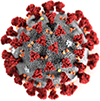COVID Numbers in Putnam County Rise to ‘Substantial’ Level
 The Centers for Disease Control has elevated the community transmission level for Putnam County from moderate to substantial, based on crossing the threshold of 50 new cases per 100,000 population over seven days.
The Centers for Disease Control has elevated the community transmission level for Putnam County from moderate to substantial, based on crossing the threshold of 50 new cases per 100,000 population over seven days.
According to the Putnam County Health Department, the latest surge is concerning given the growing body of research on the longer-term effects of COVID-19. Earlier this month, federal agencies officially recognized that “Long COVID” causes persistent and significant health issues and issued guidance clarifying how these conditions may be considered a disability under the Americans with Disabilities Act (ADA).
“We were all hopeful that we wouldn’t see another surge,” said Health Department epidemiologist Alison Kaufman, DVM, MPH. “Unfortunately, all of our indicators are telling us the same thing. Putnam County’s seven-day incidence rate nearly doubled from July 25 to August 1, with a rise in cases from 42.5 to 83 cases per 100,000 people. And the percent of tests that are positive has gone from 1.2 to 2.7 percent.”
“Post-COVID conditions, also called long COVID, are a wide range of new, returning or ongoing health problems experienced four or more weeks after initial infection with the virus,” explained Putnam County Health Commissioner Michael J. Nesheiwat, MD. “Anyone who was infected with COVID-19—including those who were initially asymptomatic—can have post-COVID symptoms, and this is happening in a high proportion of patients.”
One recent study in The Lancet found that 86 percent of patients hospitalized with COVID-19 reported at least one post-COVID symptom during a follow-up period 46-167 days after discharge; another in Acta Paediatrica found about two-thirds of pediatric patients were still experiencing at least one persistent symptom 60-120 days after their initial diagnosis.
“Everyone is tired of COVID-19,” said Dr. Nesheiwat. “However, it is still a very new disease and so the long-term consequences are not fully understood. This is a very active area of research and we are finding persistent symptoms tend to fall within several categories.”
General complaints include increased breathlessness, muscle pain, anxiety, extreme fatigue, low mood, sleep disturbances, memory impairment and “brain fog,” attention deficit, cognitive impairment and palpitations. Other more specific complaints include issues with the olfactory system [sense of smell], and in the reproductive systems of both the male and female patients.
“The bottom line is that surging cases and emerging information on long-term effects of COVID-19 underscore the importance for everyone—including young healthy people who are at lower risk for hospitalization and death—to take COVID seriously,” said Dr. Kaufman.
Dr. Nesheiwat stressed getting vaccinated is the best way residents can reduce their individual risk of post-COVID conditions and help reduce cases in our community.
“This is because as the science evolves, we are finding more serious implications for health and continued quality of life that result from infection from the COVID-19 virus,” he said.

Rick has more than 40 years’ experience covering local news in Westchester and Putnam counties, running the gamut from politics and crime to sports and human interest. He has been an editor at Examiner Media since 2012. Read more from Rick’s editor-author bio here. Read Rick’s work here: https://www.theexaminernews.com/author/pezzullo_rick-writer/
